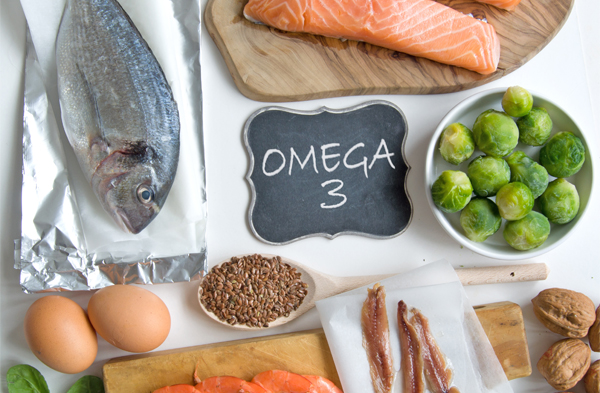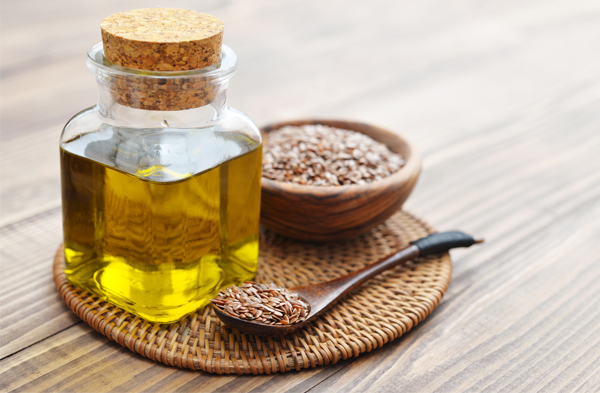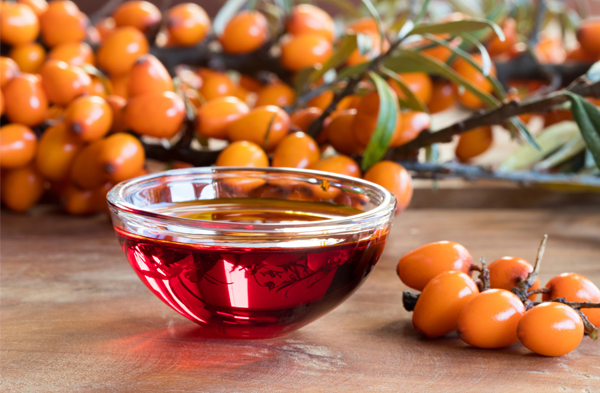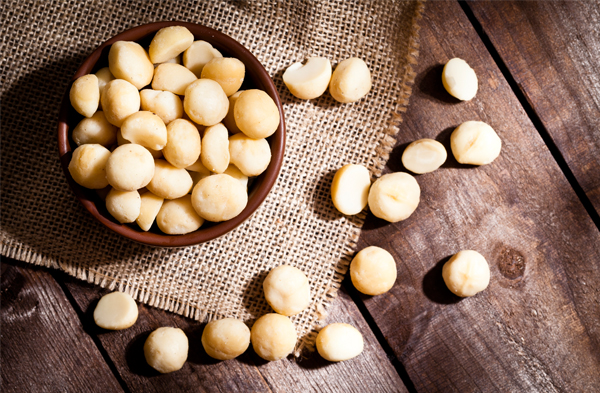What are fatty acids?
In order to understand a little more about omega fatty acids, it’s first important to establish what a fatty acid is. Simply put, as their name may suggest, fatty acids are a key building block of fat. Your body breaks down fat into fatty acids which then are then absorbed into the bloodstream where they can perform a range of functions, from fuelling your cells to reducing inflammation.
Your body needs a variety of different fatty acids to survive, however, while your body is able to produce most of the fatty acids it needs, there are two specific types that your body cannot synthesise – linoleic acid and alpha-linolenic acid.
Both of these are derived from omega-6 and omega-3 respectively and considered to be ‘essential’ fatty acids. The only way your body can get enough of these nutrients is through your diet, but unfortunately, particularly in the West, we often struggle to achieve the right balance and can end up becoming deficient, resulting in symptoms like:
- Dry skin
- Brittle nails
- Sleep problems
- Poor concentration
- Mood swings
- Anxiety
Which omega fatty acids are good for you?
When it comes to omega fatty acids, none are exclusively “bad” for you, although loosely, they can be split into two categories – essential omega fatty acids and non-essential omega fatty acids. Omega-3 and omega-6, for example, as I’ve mentioned are considered to be essential omega fatty acids as our body cannot produce them on its own and therefore relies on a dietary intake to get what it needs.
Omega 3

Omega-3 is a type of polyunsaturated fatty acids and usually three specific types of omega-3 are found in our food – Docosahexaenoic acid (DHA), Eicosapentaenoic acid (EPA) and Alpha-linolenic acid (ALA). Each specific type of omega fatty acid has its own benefits but I’ll start by looking at DHA.
DHA, like EPA, is a long-chain omega fatty acid that is considered to be crucial for brain health and cognitive function. It may even help to prevent cognitive decline according to research published in 2010.1 DHA is especially important in younger children and infants, helping with visual and neurological developments, but around the age of 5, the body’s need for DHA decreases, until later on in life. DHA is also thought to be important for cardiovascular health and may even protect against mood disorders like depression, with some studies finding that depression may be linked to low levels of DHA and EPA.2
EPA is often grouped with DHA and like DHA, it also plays an important role in brain development and cognitive health. Good levels of EPA are usually associated with increased levels of concentration and focus in children. EPA is also an important anti-inflammatory and is considered to be vital for healthy joints. It may even help to lower cholesterol levels thus improving your heart health. Interestingly, when your levels of EPA are low, DHA is sometimes extracted from cell membranes to act as a substitute for EPA.
Finally there’s ALA, the fatty acids that your body relies on but cannot synthesise on its own.
Unlike DHA and EPA, which are more commonly found in fish, ALA is a plant-based omega fatty acid so it’s often consumed by vegans and vegetarians. As a short chain fatty acid, ALA can be converted into longer chain omega acids like EPA and DHA but, as we shall discuss, sometimes this isn’t always possible due to our intake of omega 6 relative to omega 3 as well as other nutritional deficiencies. ALA is found in every cell of your body and can help to tackle oxidative stress, working as a potent antioxidant as well as improving fat metabolism. It also has anti-inflammatory qualities and has been linked to supporting insulin levels.3
The best sources of omega 3
- Mackerel
- Salmon
- Hemp seeds
- Flaxseeds
- Chia seeds
- Walnuts
My favourite omega 3 boosting recipe
Coffee Chia Pudding
1https://www.ncbi.nlm.nih.gov/pmc/articles/PMC2838628/
2https://www.verywellmind.com/the-health-benefits-of-dha-89183
3https://www.ncbi.nlm.nih.gov/pubmed/10468203
Omega 6

We’ve spoken a little bit about omega 3 but what about omega 6? Linoleic acid, like ALA, cannot be synthesised by the body but it is crucial for a number of functions, such as fighting inflammation and reducing nerve pain. Within the body, linoleic acid is converted into gamma linolenic acid, GLA.
GLA can help to reduce inflammation and has even been said to help lower high blood pressure and support bone health. However, unlike omega fatty acids which are primarily found in fish (aside from ALA), omega 6 foods are much more available in vegetable oils like safflower, sunflower and walnut, which can be problematic.
This is because these types of oils are far more readily found in our Western diet, even in unhealthy foods, which mean that sometimes we consume far too many omega 6 fatty acids. This can be a problem because, although omega 6 is still essential, we should only be consuming enough to function and no more.
When we consume too many omega 6 fatty acids and not enough omega 3, it can make us more prone to inflammation. Also, since vegetable oils are also present in processed foods like popcorn and margarine, they are often filled with chemical nasties and, once cooked at high heat they will oxidize. Since oxidized omega 6 is capable of causing inflammation and damaging your DNA this can be a real problem!
It’s estimated that the average American eats a ratio of around 12:1, with 12 omega 6s for every omega 3. Ideally, you should be trying to aim for 4:1 ratio – around 4 omega-6 fatty acids for ever omega 3 so definitely look at increasing your intake of omega 3 and not going too overboard on omega 6!4
The best sources of omega 6
- Sesame seeds
- Pumpkin seeds
- Almonds
- Pecan nuts
- Eggs
- Walnuts
My favourite omega 6 boosting recipe
Pumpkin Spice Breakfast Bars
4https://blog.bulletproof.com/omega-3-vs-omega-6-fat-supplements/
Omega 7

Omega 7 is sometimes known as the essential non-essential fatty acid. It’s not essential for your survival but omega 7 does come with an impressive array of health benefits, although it is often overlooked in favour of omega 3 and omega 6 which is a shame.
For a start, omega 7 is usually found in foods not traditionally associated with fats, such as sea buckthorn and macadamia nuts. Surprisingly, it’s also considered to be a healthy form of transfat, helping to lower inflammation and cholesterol.
The omega 7 in sea buckthorn oil has even been attributed to helping support our mucous membranes. Our mucous membranes are extremely important – they help to line the surface of your gastro-intestinal, respiratory and vaginal tracts. However, they can be vulnerable to inflammation and free-radical damage, which omega 7 helps to counteract, acting as an antioxidant.
It’s important though, that like omega 6, you don’t intake too much omega 7 as it can cause a number of unfortunate side effects, including a phenomenon known as ‘old people smell.’
The best sources of omega 7
- Macadamia nuts
- Avocados
- Eggs
- Olive oil
- Sea Buckthorn oil
My favourite omega 6 boosting recipe
Quinoa Stuffed Avocados
Omega 9

Finally, arguably the most overlooked omega fatty acid of all, omega 9 is derived from a group of unsaturated fats, sometimes known as oleic acid, which you can find in olive oil and most nut oils. Omega 9 is a non-essential omega fatty acid – your body can produce it on its own so why should you look at your dietary intake?
Well, omega 9 is usually associated with helping to support your cardiovascular health, reducing unhealthy cholesterol whilst boosting your energy levels. Omega 9 fatty acids are also sometimes stored as body fat so it’s best to avoid food sources like lard, butter etc. Too many omega 9s can cause health issues so try not to go overboard – remember, they are non-essential, so a little can go a long way!
The best sources of omega 9
- Macadamia nuts
- Hazelnuts
- Canola oil
- Olive oil
- Avocado oil
- Almond butter
My favourite omega 9 boosting recipe
Apple, Macadamia and Coconut Crumble





 Looking for our products in a store near you?
Looking for our products in a store near you?
